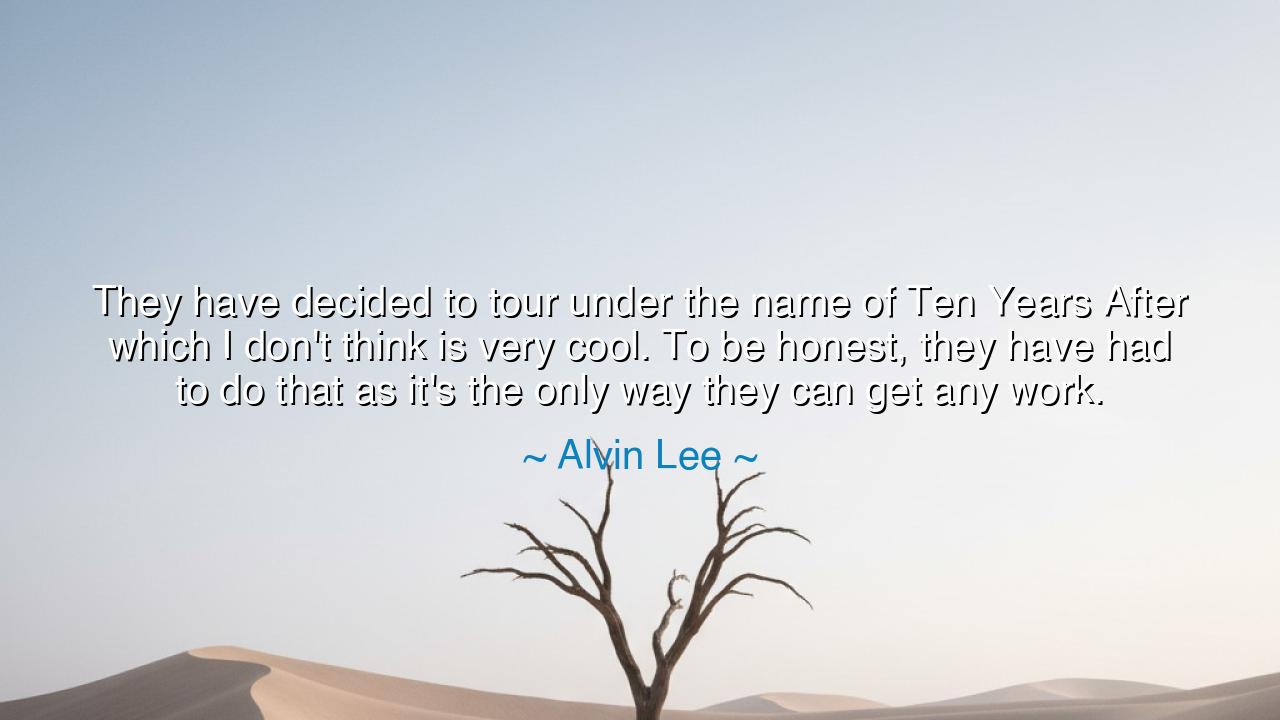
They have decided to tour under the name of Ten Years After which
They have decided to tour under the name of Ten Years After which I don't think is very cool. To be honest, they have had to do that as it's the only way they can get any work.






"They have decided to tour under the name of Ten Years After which I don't think is very cool. To be honest, they have had to do that as it's the only way they can get any work." These words spoken by Alvin Lee, the guitarist and frontman of the legendary rock band Ten Years After, reflect a deep understanding of the complexities of identity, legacy, and authenticity. Lee’s remark speaks not only to the business and market forces that shape the music industry, but to a more profound dilemma that all creative individuals and artists face: how to balance their past legacy with the need to evolve, stay true to themselves, and avoid being confined by the success they once had.
The idea of using the name “Ten Years After” to continue touring points to a significant dilemma—the tension between authenticity and commercial survival. In ancient times, the Greek philosopher Socrates warned that the pursuit of fame and wealth could cloud one’s deeper sense of truth. He believed that true greatness was found not in the external accolades of the world but in the virtue of one's character and the authenticity of their actions. Much like Socrates’ teachings, Lee’s frustration is rooted in the idea that, in order to continue the path of their earlier success, his former bandmates have chosen a name that evokes nostalgia rather than innovation. This decision, while practical, is in conflict with the notion of creativity and authentic self-expression—values that are often the driving force behind any artist's rise.
The idea of legacy is central to Lee's words. He recognizes that the name Ten Years After, which once represented a groundbreaking era in music, is now being used to pander to nostalgia rather than push forward with new, bold expressions of art. In the same way, ancient rulers like Alexander the Great faced the challenge of maintaining their legacy while also evolving their empire to adapt to changing circumstances. Alexander himself faced the pressure of being remembered as a conqueror, yet he also sought to be seen as a bringer of civilization and a unifier of the East and West. His challenge was to balance the legacy he inherited with the future he wished to shape. Similarly, artists must ask themselves: does the legacy we leave behind confine us, or does it provide the foundation upon which we build something new?
Lee’s frustration with his bandmates' decision to tour under the name Ten Years After is also a reflection of a larger issue that many creative professionals face—the battle between the old self and the new self. As artists, it is natural to evolve, to grow, and to change. But society and its expectations often want the artist to remain frozen in time, to repeat past successes over and over. Musicians, writers, actors—all creators—are often called upon to give the people what they want, even when it’s not in alignment with their personal growth or artistic vision. Lee’s words call attention to this tension, this burden of expectation that often stifles innovation and artistic freedom.
A powerful historical parallel can be drawn with Michelangelo, the renowned sculptor, painter, and architect of the Renaissance. At the height of his career, Michelangelo faced great pressure from his patrons to replicate the success of his earlier masterpieces, like the David and the Pietà. Despite his desire to continue exploring new artistic realms, he was often forced to return to his past works, like the Sistine Chapel ceiling, to satisfy the expectations of those who revered his earlier creations. Michelangelo, much like Lee, was caught in the tension between his evolving artistic vision and the desire to remain true to his legacy. This struggle is not just the experience of one individual or one band; it is a universal dilemma for anyone who must balance growth with the pull of the past.
The lesson in Lee’s words is clear: as creators, we must be mindful of the balance between honoring our past achievements and embracing the freedom to move forward. Nostalgia can be a powerful tool, but it can also become a shackling force, preventing us from moving forward and embracing new possibilities. If we are constantly looking backward, we risk missing the opportunities that the future holds. Authenticity is found not in repeating what once worked, but in the courage to forge ahead into the unknown, to create something new that reflects who we are in the present moment.
In our own lives, whether in our careers, relationships, or creative endeavors, we must learn to embrace the tension between past success and future potential. It is easy to fall into the trap of relying on past achievements, to cling to familiar identities that once brought us recognition or fulfillment. But like Lee, we must ask ourselves: are we moving forward? Are we truly embracing change and evolving with the world around us? The courage to step into the future often requires leaving behind the security of the past, and it is only through this act of boldness that we will find our true path forward.
Let us not fear the idea of letting go of what once was. Instead, let us be inspired to create boldly, to honor the legacy we have built but not allow it to define or restrict us. The world is waiting for our next creation, our next expression, our next step forward. Just as Lee challenges his former bandmates to break free of nostalgia, let us break free from our own attachments to past identities and embrace the unknown future with confidence and determination.






AAdministratorAdministrator
Welcome, honored guests. Please leave a comment, we will respond soon